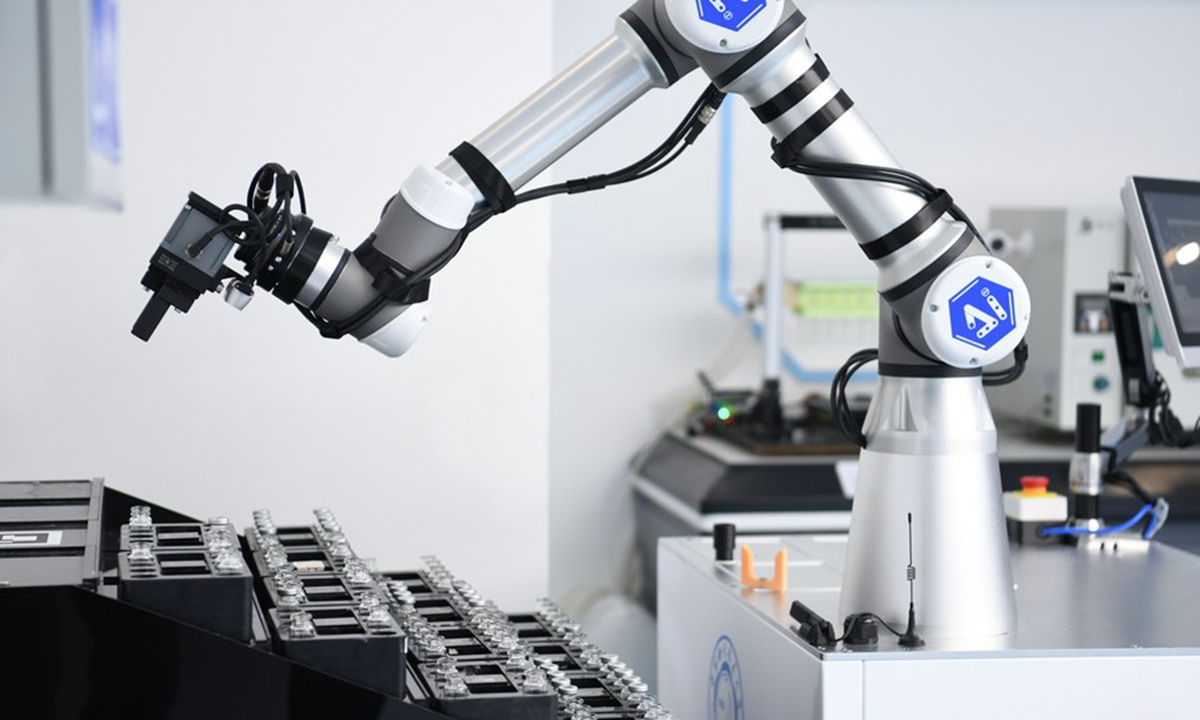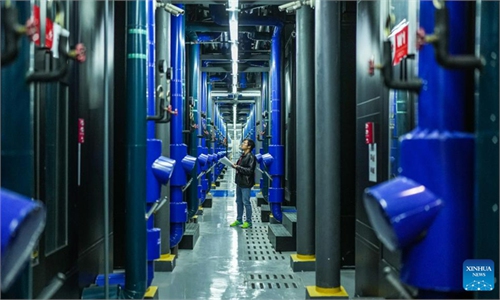Chinese leadership highlights continuous efforts to strengthen core competitiveness of manufacturing

The AI-Chemist system performs a chemical experiment at a laboratory in the University of Science and Technology of China in Hefei, east China's Anhui Province, Oct. 21, 2022. Photo: Xinhua
The Chinese leadership has called for continuous efforts to strengthen the core competitiveness of the manufacturing sector and bolster the modernization of supply and industrial chains, in a major effort to promote China's high-quality development and modernization drive.
The remarks came against the backdrop of the escalated tech war between China and the US in recent years, as the US has continued its attempts to suppress China's science and technology development.
Chinese experts said the remarks show the strategic vision of the leadership, and also "the importance and urgency" of tech progress in the face of the prolonged US technology blockade. Chinese technology companies said they are encouraged to become technologically self-reliant, and their confidence in innovation has been spurred.
Xi Jinping, general secretary of the Communist Party of China (CPC) Central Committee, has called for further promoting the high-quality development of the Yangtze River Economic Belt to better support and serve Chinese modernization.
Xi, also Chinese president and chairman of the Central Military Commission, made the remarks on Thursday at a symposium he chaired on advancing the development of the Yangtze River Economic Belt, according to Xinhua News Agency.
He said continued efforts should be made to strengthen the core competitiveness of the manufacturing sector, develop advanced manufacturing, enhance coordination along the industrial chains, promote the extension of industrial chains for competitive industries, and cultivate emerging industries.
Xi called for better playing to the strengths of the economic belt in terms of its location and connectivity to provide strategic support for the creation of a new development pattern, while actively promoting high-standard opening-up and expanding global economic cooperation.
This is another important explanation for comprehensively and profoundly improving scientific and technological innovation by the Chinese leader, Ma Jihua, a veteran industry analyst, told the Global Times on Friday.
The remarks were delivered in East China's Jiangxi Province, a manufacturing hub on China's southeast coast, where scores of advanced technology and production companies are located, which also encourage the companies to be confident in self-reliance, Ma said.
Focusing on strategic emerging pillar industries such as semiconductors and displays, the group will promote industrial chain extension, and continue to implement and enhance the core competitiveness of the manufacturing industry, Zhejiang Sineva Intelligent Technology Co, a tech company that seeks to provide mobile robot solutions, told the Global Times on Friday, in response to the leader's remarks.
We will strive to cultivate and strengthen advanced manufacturing, accelerate the development of strategic emerging and future industries, and further promote the deep integration of the digital economy and real economy, the company said.
Chinese experts said that the tough situation that China is facing in the tech field requires strategic guidance, as it needs practical joint measures led by the government and participation of enterprises, including follow-up policy support and cultivation of talent.
In the face of the US' intensified blockade and the waging of the tech war against China, we can also feel the importance and urgency of making tech progress, Ma said.
The US has never stopped its escalated technology war against China. As one of the latest acts, the Biden administration is considering closing a so-called loophole that gives Chinese companies access to American artificial intelligence chips through units located overseas, Reuters reported on Friday.
Last week, US politicians sent a letter to the US President's National Security Advisor Jake Sullivan urging the Biden administration to take immediate tougher measures in regulating chip exports to China, including action against SMIC and Huawei, Reuters reported.
In the face of a US blockade, the Chinese government has also taken sci-tech self-reliance and self-strengthening as strategic support for national development, while also actively seeking international cooperation in the sci-tech sector.
Chinese experts said that the tough situation that China is facing in this field can also be taken as an opportunity, "forcing us to systematically solve the current bottleneck problems and achieve high-level development," Ma said.
On Monday, China introduced new policies to promote the high-quality development of the computing power industry, which will further strengthen top-level design and enhance the infrastructure so as to give the country an edge in building up its digital economy and deal with fierce international competition.
Despite the US sanctioning Huawei for four years and Washington elites calling for the company to be shut down, Huawei still launched the Mate 60, a futuristic smartphone, prompting US Commerce Secretary Gina Raimondo to say she was "upset" over the phone and its advanced chip during her visit to the country last month.

